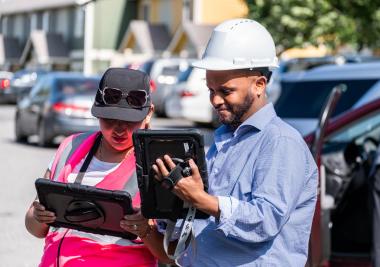Digital Equity for All
"Digital equity is a matter of social and economic justice"


Significance:
Digital technologies affect almost every area of modern life and business. Access to the infrastructure, technology, and skills enables individuals to digitally engage in economic, educational, social, and civic spaces.
Disparities in broadband access, digital literacy, access to devices, and accessibility persist in our communities. There is a digital divide between those who have access to technology, skills, and devices and those who do not.
We must ensure that all individuals and communities, regardless of socioeconomic status, race, ethnicity, geographic location, age, or ability, have access to affordable, reliable technology and internet services, as well as the skills and opportunities needed to fully participate in the digital world. We must also address systemic disparities in access to digital tools, infrastructure, and education, enabling everyone to benefit equitably from technological advancements.
Broadband Infrastructure
Internet access fosters community connectivity, economic and learning opportunity, access to digital economy, online services and quality of life improvements. In Washington, internet connectivity can vary significantly depending on where you live and what you can afford.
- Availability of Internet
- Affordability of Internet
- Reliability of Internet

Connected Devices
A computer or a connected device is a vital tool for accessing and processing information and data, as it is the first window to access the Internet. It also allows people to participate in the digital economy, find employment, obtain training and seek other basic needs such as health resources, participate in remote work/ schooling.
- Availability of Devices
- Affordability of Devices
- Technical Support and Self-Sufficiency

Barrier-Free Access
As services and resources are increasingly provided in digital formats, everyone can access them regardless of disability, language, etc. Creating and supporting barrier-free design, standards, systems, processes, and environments so that all individuals, regardless of ability, background, identity, or situation, can participate in, use, and enjoy the benefits of: employment, programs, services, activities, communication, facilities, electronic information technology, and business opportunities.
- Digital Accessibility
- Language Access
Digital Skills + Information Literacy
Digital equity relies on digital literacy to drive adoption as well as encourage self-sufficiency, participation, and collaboration in digital spaces. Digital skills and information literacy training should be made available to support people using technology find, evaluate, organize, and communicate information. A critical component of digital literacy includes cybersecurity and online privacy. Washington needs to provide information and resources so that everyone may secure their online privacy and cybersecurity and enable every person safely navigate through digital spaces to access public services safely and securely.
- Digital Skills & Literacy
- Media & Information Literacy

Resources and News
- 2021-05-24-Digital-Divide-Report.pdf (wa.gov)
- Washington Broadband Map (broadbandnavigator.com)
- Digital Equity Plan
- BEAD 5 Year Action Plan
- Digital Equity Capacity Grants Update
- 24-01 - Artificial Intelligence (tmp).pdf (wa.gov)
- Unveiling the Digital Divide (libguides.com)
- Washington State Library Digital Skills Assessment Final Report
- Digital Literacy - Thurston County Chamber of Commerce (thurstonchamber.com)
- Link to Care WA – Get Connected, Stay Healthy
- BAT Contacts.pdf | Powered by Box
- TechConnectWA
- Becoming-Broadband-Ready-Toolkit-web.pdf (wa.gov)
And More
- Data Equity, Justice, and Sovereignty
- Innovation and Emerging Technology
- Generative Artificial Intelligence
